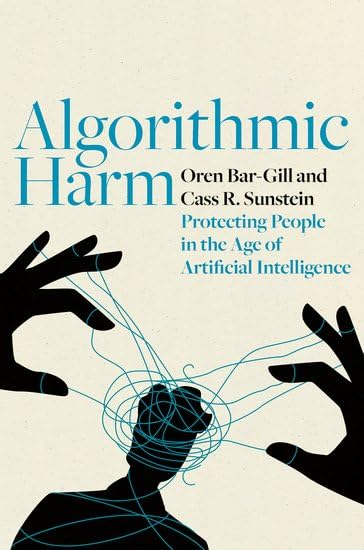
Book Bits: 21 June 2025

By purchasing books through this site, you provide support for The Capital Spectator’s free content… Press) The euro has survived crises unimagined at its founding: the financial meltdown of 2007–2009, the sovereign debt crisis of 2010–2012, the pandemic, and the Russian invasion of Ukraine…
 ● Algorithmic Harm: Protecting People in the Age of Artificial Intelligence
● Algorithmic Harm: Protecting People in the Age of Artificial Intelligence
Oren Bar-Gill and Cass R. Sunstein
Summary via publisher (Princeton U. Press)
Will algorithms help people or hurt them? What about artificial intelligence in general? If consumers know what they need to know and do not suffer from behavioral biases, algorithms and AI are likely to be helpful. Consumers will be more likely to get what they want and need. But if consumers lack information, algorithms in particular will be able to convince them to make harmful or foolish choices. And if consumers suffer from behavioral biases, such as unrealistic optimism or a focus on the short term, algorithms will be able to produce serious harms. In Algorithmic Harm: Protecting People in the Age of Artificial Intelligence, Oren Bar-Gill and Cass Sunstein consider the harms and benefits of AI and algorithms and catalog the different ways in which algorithms are being or may be used in consumer and other markets.
 ● Crisis Cycle: Challenges, Evolution, and Future of the Euro
● Crisis Cycle: Challenges, Evolution, and Future of the Euro
John H. Cochrane, et al.
Summary via publisher (Princeton U. Press)
The euro has survived crises unimagined at its founding: the financial meltdown of 2007–2009, the sovereign debt crisis of 2010–2012, the pandemic, and the Russian invasion of Ukraine. The European Central Bank fought these crises with dramatic policy innovations, buying up vast amounts of debt and providing large loans to banks. But now everyone expects the ECB to intervene routinely, and the euro is more fragile as a result. Crisis Cycle recounts this history and offers recommendations for restoring a durable monetary union.
 ● Human Nature: Nine Ways to Feel About Our Changing Planet
● Human Nature: Nine Ways to Feel About Our Changing Planet
Kate Marvel
Review via Publishers Weekly
In this impassioned debut report, climatologist Marvel uses the emotions engendered by the climate crisis to explore the science of global warming. Reflecting on her anger over inaction in the face of damning evidence, Marvel describes how the warnings of 19th-century scientist Eunice Foote, who was among the first people to realize that rising CO₂ levels would increase global temperatures, were dismissed because she was a woman. Marvel also covers the fear-inducing realities of a warmer planet, explaining that weather stations in Pakistan and the United Arab Emirates have recorded combinations of heat and humidity so extreme that sweating can no longer cool the body and even sitting in the shade with an unlimited supply of water couldn’t prevent fatal heatstroke.
Please note that the links to books above are affiliate links with Amazon.com and James Picerno (a.k.a. The Capital Spectator) earns money if you buy one of the titles listed. Also note that you will not pay extra for a book even though it generates revenue for The Capital Spectator. By purchasing books through this site, you provide support for The Capital Spectator’s free content. Thank you!
Author: James Picerno
